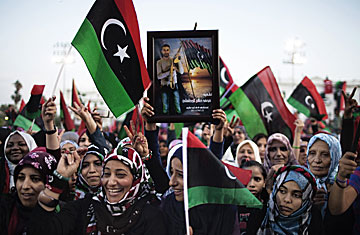
Libyan women celebrate in Tripoli following news of Muammar Gaddafi's capture and death on Oct. 20, 2011
Should Libyans care how Muammar Gaddafi died? As the debate continues over whether rebel fighters executed Gaddafi after capturing him — in violation of international rules of war — the issue has raised stark differences between Libya's new leaders, who suffered for decades under a suffocating dictatorship, and the views of some of their closest Western allies.
In numerous interviews over the weekend in Tripoli and the eastern city of Benghazi, not a single Libyan — including top officials of the new regime — expressed serious concern that Gaddafi might have been executed after being captured alive. Instead, the general feeling might best be summed up by Colonel Omar Hariri, a war hero, who had been a comrade-in-arms of Gaddafi during their coup in 1969, and who headed this year's rebel military forces in eastern Libya. As Hariri greeted fighters returning to Benghazi from the front in Gaddafi's birthplace of Sirt on Saturday, TIME asked him if he was concerned about how Gaddafi had died. "I don't care, so long as he's dead," he said. In a separate interview on Sunday, the interim Finance and Oil Minister Ali Tarhouni — who told TIME he has been asked to be the new interim Prime Minister — said he felt "relieved" that Gaddafi had been killed.
The great majority of Libyans are rejoicing his death too. Libyans have emerged from a very long nightmare, in which two generations lived in terror under Gaddafi's dictatorship. The details of how he met his end seem irrelevant to most of them. In death, Gaddafi has become an object of ridicule, as though he were just a pathetic old man, rather than their omnipotent ruler. The walls in Benghazi and Tripoli, which for years were plastered with portraits of Gaddafi as the untouchable leader, are filled with graffiti portraying him as a bushy-haired clown. And thousands of people have lined up to view Gaddafi's bloodied and beaten corpse, which has been laid out since Friday in the cold-storage room of a food market in Misratah, about 150 miles (240 km) east of Tripoli.
No one doubts the terrifying brutality of Gaddafi's rule, which put thousands of political foes on death row with perfunctory trials. Yet on Sunday, Western officials nonetheless said they were unhappy with what they had heard of the way he died. British Defense Secretary Philip Hammond told the BBC that the rebels' reputation had been "a little bit stained" by Gaddafi's death. And U.S. Secretary of State Hillary Clinton — who visited Tripoli two days before Gaddafi was killed — told NBC's Meet the Press that she supported the U.N.'s call to investigate how he died.
On Sunday morning Libya's chief pathologist, Dr. Othman al-Zintani, confirmed in an autopsy that Gaddafi had died from a gunshot to his head. But he told reporters he would not publish the autopsy report. Al-Zintani said it would be delivered to Libya's attorney general. That seemed to contradict assurances from interim Prime Minister Mahmoud Jibril on Thursday, when he told reporters he would make public all the details of Gaddafi's death as soon as the autopsy was completed.
Gaddafi and his son Saif al-Islam were indicted earlier this year by the International Criminal Court (ICC) in the Hague for crimes against humanity, for having allegedly ordered their forces to kill unarmed demonstrators in eastern Libya in February, before the rebels took up arms. For months, rebel leaders assured Western governments that they intended to put the Gaddafis on trial, but had stressed that they would prefer to try him in a Libyan court, rather than transfer him to the ICC.
